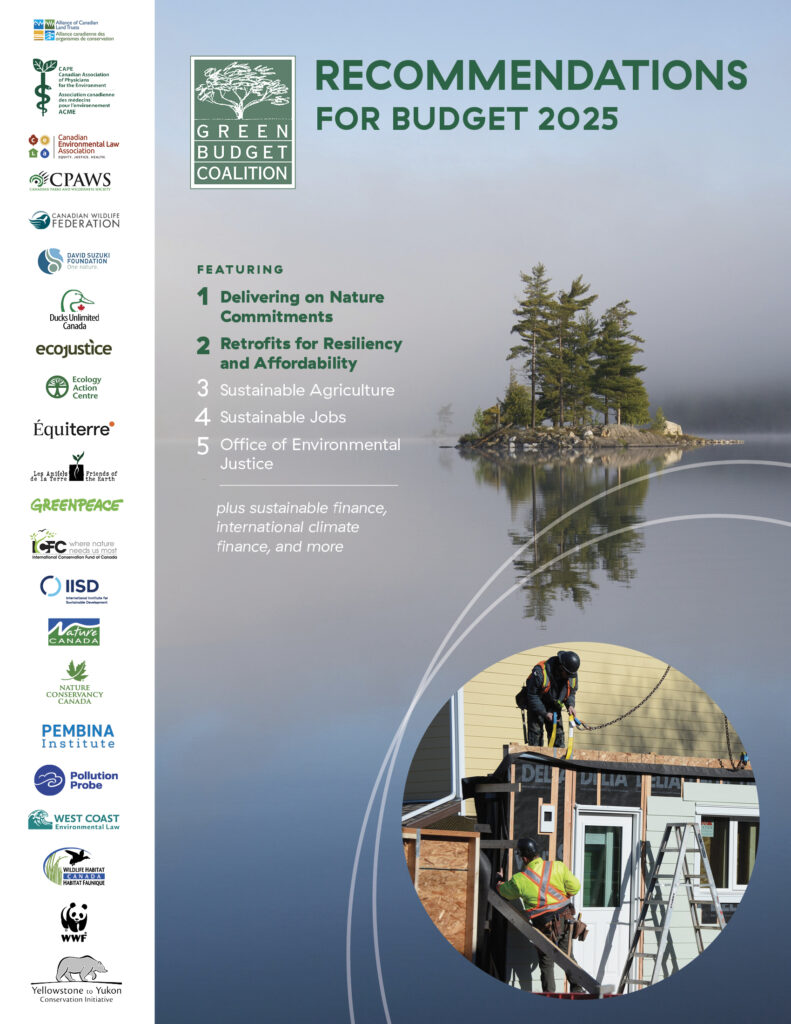
Budget 2025 provides a prime opportunity, responsibility and imperative for the federal government to renew and strengthen action on the linked climate and biodiversity crises, while making life more affordable, reducing future costs, creating quality jobs, and protecting health and safety, particularly for vulnerable communities.
Canada has demonstrated leadership in protecting and enhancing nature and biodiversity by adopting the Kunming-Montreal Global Biodiversity Framework (GBF) in 2022, and then releasing Canada’s 2030 Nature Strategy as its implementation plan. Canada now has a broad suite of commitments to halt and reverse biodiversity loss by 2030, however renewed and expanded funding is needed to fulfill them.
To meet our Paris Agreement commitments, Canada must achieve a 60% reduction in GHG emissions below 2005 levels by 2030 and contribute our fair share to global emission reductions. Budget 2022 noted that $125-140 billion needs to be invested in climate action per year by 2050.
Implementing these Green Budget Coalition recommendations would lead to transformative progress in advancing enduring environmental, economic, and social prosperity for all peoples in Canada from coast to coast to coast.
Feature Recommendations
Complementary Recommendations
Integrating Climate and Nature Across Canada’s Financial Systems, Fiscal Policy, and International Funding
- Sustainable finance: Aligning Canada’s financial system with climate and biodiversity commitments
- Canada’s international climate and biodiversity finance contributions
- Transparent elimination of domestic public finance and subsidies for fossil fuels
- Canada’s industrial carbon pricing system, and complementary mechanisms
- Moving towards a more circular economy by prioritizing upstream solutions, including reuse and repair
Climate Action Through Emissions Reductions
- Advancing a zero-emissions electricity grid
- Windfall profits tax on oil and gas companies
- Transportation
- Marine shipping
- Double public transit ridership by 2035
- Strengthening Canada’s public electric vehicle charging network
- Updating iZEV program to accelerate decarbonizing personal transportation
- A clean commute for kids: Bridging the funding gap for school bus electrification
- The road ahead: Zero-emission medium and heavy-duty vehicles
Climate Adaptation
Delivering on Nature Commitments
- Delivering on Nature Commitments Feature Recommendation – More Details on Select Elements
- Renewing and Building on the Enhanced Nature Legacy and Marine Conservation Targets Programs
- Prioritizing support for Indigenous-led conservation in Enhanced Nature Legacy renewal
- Renewing Canada’s Marine Conservation Targets (MCT) funding
- Establishing and managing promised new National Parks, National Marine Conservation Areas and National Urban Parks
- Ecological connectivity: Renewal of Parks Canada’s Ecological Corridors program
- Natural Heritage Conservation Program (NHCP) renewal and expansion
- Advancing Other Key Elements of Canada’s 2030 Nature Strategy
- Renewing and Building on the Enhanced Nature Legacy and Marine Conservation Targets Programs
- Complementary Recommendations to Deliver on Canada’s 2030 Nature Strategy
- Reducing Threats to Biodiversity (KMGBF Targets 1-8)
- Comprehensive geospatial inventories (Targets 1, 2, 3, 4, 8, 10, 21)
- Establish a new Habitat Infrastructure Renewal Fund
- Establishing an endowment fund (The Canada Conservation Investment Fund) to strengthen the private land conservation sector
- Ecological connectivity: Nationwide fund and wildlife crossings pilot program
- Halting and reversing losses of Canada’s bird populations (Targets 2, 3, 4, 10, 21)
- Invasive species – Controlling their economic, social, and environmental impacts (Target 6)
- Reducing Pollution (Target 7)
- Meeting People’s Needs (KMGBF Targets 9-13)
- Managing ocean fisheries (Target 10)
- Freshwater management (Target 11)
- Tools and Solutions (KMGBF Targets 14-23)
- Reducing Threats to Biodiversity (KMGBF Targets 1-8)


